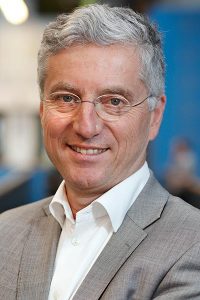Prof. Sicco Santema, Professor of Marketing and Supply Management at TU Delft and Coordinator of the PASSME project, interviewed by Ross Falconer.

Prof. Sicco Santema, Professor of Marketing and Supply Management at TU Delft and Coordinator of the PASSME project: “The largest bottleneck is stress. The biggest win is in personalised information, pulled out of the system by the passenger if and when they need it. Pushed information, on the other hand, causes extra stress, as it is not really personalised.”
Reducing the door-to-door air travel experience by 60 minutes is certainly ambitious, but that is the goal of the Personalised Airport Systems for Seamless Mobility and Experience (PASSME) project.
The three-year initiative, launched in summer 2015, is funded by the EU’s Horizon 2020 programme and brings together 12 partners from the fields of aviation, transport, academia, design, technology, and communications. Importantly, this includes two airports – Amsterdam Schiphol and Hamburg – which are participating in trials as the PASSME vision becomes reality.
Prof. Sicco Santema, Professor of Marketing and Supply Management at TU Delft and Coordinator of the PASSME project, articulates four breakthroughs that are currently being worked on:
• Develop a real-time system for managing luggage flow. This breakthrough is already realised on a conceptual basis, and is now being tested in practice with a start-up company called Travel Light.
• Design a passenger forecast system to manage people-flow through the airport – currently in the conceptual stage.
• Improve aircraft and airport interiors. “The intermediate results are now ready for testing, as planned,” says Santema. “A fuselage is installed at the TUDelft premises, so PASSME can test independently from operations at an airport. It will also be tested at Amsterdam Schiphol and Hamburg airports.”
• Produce a smartphone app to provide passengers with key airport information – currently in the conceptual stage.
Creating the ‘bag-free airport’
Santema explains that PASSME looks at the entire passenger journey, from home to destination and back. Key areas of attention include reducing the time spent on baggage – from checking-in bags to loading and unloading luggage from the aircraft – and reshaping the boarding process.
It is the proposed changes to the baggage process that have the potential to provide the biggest time-saving – these alone could reduce the journey time by 40 minutes, according to Santema. Door-to-door baggage delivery services may have an important role to play. “We know it is possible to transport baggage directly from home to destination, and we also know that the accuracy will increase enormously. The number of mishandled items at a parcel service company is close to zero, whereas 2-3 in every 1,000 is typical in aviation,” Santema comments. “A bag-free airport is, therefore, feasible. It all depends on passenger behaviour and their acceptance of the idea.”
While reshaping existing airport processes is at the heart of the PASSME project, the partners are also exploring which areas of the air travel experience cause the most stress and anxiety, and how these can be remedied. The Human Factors Research Group at the University of Nottingham is leading research in this area, some of which includes the use of wearable technology.
“The largest bottleneck is stress,” says Santema, identifying pinch points such as waiting to check-in and drop off baggage, going through passport and security checks, boarding, and waiting for luggage on arrival. “The biggest win is in personalised information, pulled out of the system by the passenger if and when they need it. Pushed information, on the other hand, causes extra stress, as it is not really personalised.”
Alongside the usual flight information, airport maps, etc, a central concept of the PASSME smartphone app is assessment of a traveller’s self-reported stress levels. If the system senses that the passenger is stressed, it may offer a pep talk or locations within the airport to go to relax. Santema speaks enthusiastically about the possibility to use big data systems to push information to passengers. “The smartphone app is able to collect personal information, like stress levels, of a single passenger and couple that to real-time data in the system. The system will provide information that helps the specific passenger at that moment. We assume this will make a big difference to the acceptance of information, as well as the experience of it. That is what we are going to test in the second half of the PASSME project,” Santema concludes.







